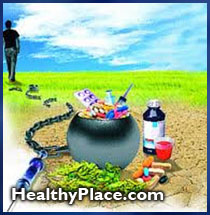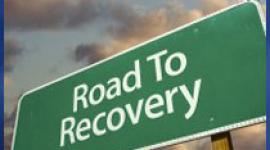Addictions and Dual Diagnosis Online Conference Transcript

Dr. Thomas Schear, is a Certified Alcohol and Drug Counselor with about 20 years experience in the field. The discussion centered around alcoholism and drug addiction and dual diagnosis, along with self-medicating.
David Roberts is the HealthyPlace.com moderator.
The people in blue are audience members.
David: Good evening everyone. I'm David Roberts. I'm the moderator for tonight's conference. I want to welcome everyone to HealthyPlace.com. Our topic tonight is "Addictions and Dual Diagnosis" and our guest is Dr. Thomas Schear. We'll be discussing addictions treatment and the topic of dual diagnosis - having a psychiatric disorder and an addiction at the same time.
Dr. Thomas Schear is a licensed marriage and family therapist and a Certified Alcohol and Drug Counselor. He has over 15 years of experience working with clients who deal with substance abuse problems and dual diagnosis. Just so everyone is clear on the term dual diagnosis, it means someone who has a mental illness, psychiatric disorder and an addiction. Sometimes that involves self-medicating behaviors. Tonight, we will be talking about addictions issues AND also dual diagnosis.
Good evening Dr. Schear and welcome to HealthyPlace.com. Thank you for being our guest tonight. Why is it so difficult to kick addiction?
Dr. Schear: I am glad to be here. I have been looking forward to this.
There are a lot of reasons why it is so hard to kick an addiction habit. Part of the reason is that it becomes part of a lifestyle that begins to set the person up to behave in certain ways and expect certain outcomes.
For some, the reality is too hard to handle in some ways. It seems that the addict is someone who feels pain more readily than the rest of us. They salve the pain by using alcohol or drugs. Then, we counselors try to convince them they don't need it.
David: So, would you say that some people are "more susceptible" to developing an addiction habit than others?
Dr. Schear: Perhaps. To some extent, addictive behaviors are a lifestyle choice. To another extent, people see how a parent, or other adults, deal with life's challenges by using a substance so they try it. For most of us, using alcohol is no big deal, but for the person who may be more susceptible, their first drink is a sensation and clearly the solution to their problems. It is when the person's usage is more of a problem than a solution, that they are faced with a dilemma.
David: At this time, I want to give our audience the link to the HealthyPlace.com Addictions Community. Here, you will find lots of information related to the issues we are talking about tonight. Also, you can sign up for the mail list on the side of the page so you can keep up with events like this.
Dr. Shear, when it comes to treatment for addictions, when is it time to say "I need help"?
Dr. Schear: Frequently, the user has to experience the consequences of their usage and resultant behaviors before they decide it is time to get help. Generally, family, friends, and others, enable the user by paying fines, making excuses, tolerating the intolerable behavior. These people need to withdraw their enabling behaviors, so the user begins to experience the pain associated with their use. Usually, it is the pain that leads to seeking help. The pain of recovery is seen as less than the pain of continuing addictive behaviors.
David: And before we get to some audience questions, I have one more question: there's self-help, seeing a therapist, getting outpatient treatment and inpatient treatment. How does one figure out which treatment for addictions to choose? And, in your experience, what works best in initially treating an addiction habit?
Dr. Schear: In recent years, Client Placement Criteria have been established by ASAM to better determine what level of care is appropriate for the addictive client. Everyone is measured on several continuums having to do with withdrawal symptoms: how much of a support system does the person have, if they also have medical problems, psychological problems that need additional support, etc. Depending on how "healthy" a person is, will determine where they ought to go for treatment. The person who has no withdrawal symptoms, who has the support of clean and sober family and friends, has a job, no psychiatric or medical problems and maybe a couple of drunk driving charges, may be appropriate for an outpatient setting. However, the person with no support system, who has experienced withdrawal symptoms in the past, has medical and maybe psychiatric problems will need more intensive and long-term care. The level, or intensity of care, really depends on a lot of these factors. It appears that the introduction of managed care and funding issues seems to drive some of this, but it does better utilize the resources too.
David: Here are some audience questions, Dr. Schear:
squeaker: I have been sober for nine months now. My doctor says I am not an alcoholic, it is solely due to my bipolar disorder. That I am self-medicating. People close to me disagree. What is your opinion?
Dr. Schear: The concern I have when someone has a psychiatric diagnosis and drinks is that the combination of medication with alcohol can negate the effects of the medication. The result, then, is that a bipolar condition is not being properly treated because the client is also using alcohol. It is less of a question of whether you are alcoholic or not than it is a question of properly treating the psychiatric condition. By the same token, if a person wants to drink so badly that they will interfere with their treatment for a bipolar condition, maybe alcohol use is a problem. The main concern should be properly treating the psychiatric condition.
GiddyUpGirl: I was wondering if you know anything about SSI (Social Security Insurance) and if one could be terminated if they were found to be a substance abuser. I really need treatment and I am close to signing myself into a psych ward for depression and need to know if I should tell them about my addiction?
Dr. Schear: I don't know much about SSI except that a few years ago there was the push to get addicts and alcoholics off SSI. Too often the checks were going to the alcoholic's bartender.
Yes, you must tell the people at the psychiatric ward about your addiction. They cannot properly diagnose or treat the psychiatric problem if they do not know about that. Your use of substances is likely contributing significantly to the depression, and the depression may lead you back to substance use. Both need treatment or you likely won't recover from either.
Chesslovr: I have been clean and sober for 18 years but have been given Valium by my doctor for medical problems. Is it safe?
Dr. Schear: Valium is a drug and all drugs have their effects. Does your doctor know about your recovery? Is the valium a temporary solution or a more or less permanent thing? Keep clear with your doctor and yourself what the is for. Remember that it is a mood-altering drug. Keep clear on your relapse pattern and symptoms, so you don't lose your sobriety.
David: Earlier, I mentioned the term "dual diagnosis," having a mental illness and an addiction? Of the addiction population, how many people, would you guess, fall into that category (percentage-wise)?
Dr. Schear: That is hard to say. One question that always comes up with this topic is "which came first?" Did the person have mental health problems before they began to use, or did their using cause a mental health problem? You don't really know until the person has been clean and sober for a while. If psychiatric symptoms persist, there is apparently a co-existing problem that needs treatment. Much more frequently though, for the vast majority of addicts, once they stop using, much of the psychiatric problems go away. They may still feel guilty, angry, depressed, but much of that may be the result of the things they did while using, rather than a psychiatric condition. A period of being clean and sober and a thorough assessment, are essential to sort this all out.
msflamingo: Are the signs of drug use, specifically of cocaine, always obvious? Or are there body indicators to tell if drugs have been used? In other words, change of skin tone or such, to indicate "closet" use? My question is based on the recent discovery of my husband having used drugs for many years while on the road. I was not aware of it until he was home for an extended period. Before that, he managed to hide it really well. People have told me the skin tone and color change, as well as other indicators from the body, are signals to the use.
Dr. Schear: People who use get good at hiding, covering up, and otherwise distracting people away from their alcohol and/or drug use. Sometimes a person has used so much for so long, that no one knows how they are when they are clean and sober. The user person becomes the way everyone knows them. Each drug has its own way of showing itself, whether by slurred speech, flushed face, or whatever. Mostly, the challenge for family members is to notice things like missing time, missing money, missed appointments, unfulfilled obligations, etc. Vague explanations usually indicate that there is something going on that they want to hide and anger is a way to distract you from finding out what's really going on. The fact he got away with it for years, suggests that he was particularly well-practiced in hiding it from you. There may have been suggestions that there was something going on, but you may have not known what you were looking for and accepted an explanation that made things seem okay.
imahoot: I used alcohol and drugs as a numbing behavior, which in reality caused more chaos, depression, anxiety, and break down of the physical, psychological and spiritual systems. Do you feel that a person should work on their addiction first, then their internal issues, or visa versa, or both simultaneously?
Dr. Schear: Generally, the person should get clean and sober first. Substance use does nothing but contribute to the chaos. Abstinence is the first thing you need to do. You cannot deal with the problems of depression, anxiety, etc. while you are bathing your brain with any number of drugs. Besides, once you get clean and sober, you may find that many of the emotional, spiritual, physical problems may get resolved. Those that don't, can then be treated. But until you are clean and sober, I, for one, would know where to start.
David: Here's the link to the HealthyPlace.com Addictions Community. Also, here's the link to Dr. Shear's web site.
Here is another audience question:
annie1973: My husband has been trying to kick his crack addiction for 2 years and just relapsed a week ago after being clean for 5 months. He seemed fine to me, but things are pretty stressful around here. Are there any warning signs I could spot, so I can intervene? Or shouldn't I try to intervene at all?
Dr. Schear: You should intervene ASAP. The fact that you have let him go this long without intervening, conveys the message that him staying clean and sober is not a priority for you so why should it be a priority for him. The fact that things are "stressful" means that things aren't okay. The fact that he relapsed means that he did not do all the things he needed to do, to stay clean and sober. That should not be rewarded by skirting the issue. Besides, crack use may be only what you know about. Think about the other things he was up to in the past when he was using. Likely, he is up to the same things again. Intervene As Soon As Possible.
rooster48: Is Dr. Schear familiar with the use of SMART (Self management and Recovery Training) or REBT (Rational Emotive Behavior Therapy?) Has he had any experience with using cognitive therapy as an alternative to 12 Step programs? Cognitive therapy came about in the late '50s with REBT by Dr. Albert Ellis.
Dr. Schear: Yes, I am. In fact, most of my work is using the cognitive approach. I do know that AA, NA, etc. is not for everybody. I find that, for many, the religious tones of the 12 step programs turn some people off, while the cognitive approach works in recovery. We are dealing with powerful drugs that can really bend a person's view of reality and interfere with a person's ability to think rationally for quite some time.
just_another_addict: I was wondering what to do when you have like a craving or an attack where you really want to drink? How do you handle that?
Dr. Schear: There are a variety of techniques you can use, such as distracting yourself by doing something else, call someone, talk, read, whatever. But more importantly, find a relapse prevention program at an agency in your community. They can teach you how to look at your relapse pattern, how to handle high-risk situations, techniques for dealing with the cravings, thoughts of using, etc. It is largely a matter of you paying attention to what precedes the cravings, and then doing and thinking something different to avoid it in the future. But a full fledge relapse prevention program based on the information of Dennis Daley and Terry Gorski will go a long way toward helping, as you deal more effectively with cravings.
Funny Face1: If the alcohol addiction is combined with bipolar, how do we, the family, get him to understand how badly he needs to get help?
Dr. Schear: It depends on how functional they are to start with. It may depend on the laws of your state. If they are at all functional, you may be able to do an intervention with the help of someone who is trained in doing that sort of thing. If they are a potential harm to themselves or others, in some states the courts can get involved. With patients rights and whatever, some states have gotten away from commitments to hospitals. You need to take care of what they can't take care of themselves, and that is to get help. There may come a point though, where you even have to step back from that stance if your best efforts are rejected by the family member.
shylight: Is it possible for a recovering addict who also has DID (Dissociative Identity Disorder) and depression, to stay clean and sober without medication?
Dr. Schear: Unlikely. The combination suggests that medication is being prescribed to control the depression and the DID, but taking medication and staying clean and sober is a small price to pay for being able to live a reasonably normal life.
Phhantom: Given the power of self-help, people seem to get through their days better using it. What is your opinion on the "why's" people choose not to employ these tools? And how effective do you think they are in dealing with an addiction?
Dr. Schear: The reason why some people don't use the self-help groups are as varied as people themselves. What is really important to me, when doing counseling, is for the person to find what works for them in staying clean and sober and enjoying life. Self-help groups provide the support and give the user the sense that they are not alone in either their pain or in their recovery. Not everyone needs that if they have other support in their family, church, or whatever. Support is where you find it. I am pragmatic about this. I don't insist on self-help groups, I insist that the client do the things that promote health.
David: I know it's getting late. I want to thank Dr. Schear for being our guest tonight and sharing his knowledge and expertise with us. Dr. Schear's website address is http://www.ccmsinc.net.
I also want to thank everyone in the audience who came tonight and participated. I hope you found this conference helpful.
Our next conference is about OCD (Obsessive Compulsive Disorder) with Dr. Alan Peck, who has been treating OCD patients for 20 years. He calls OCD "one of the most emotionally painful psychological problems that exist."
Dr. Schear: Good night.
David: Thanks everyone and good night.
APA Reference
Gluck, S.
(2007, August 1). Addictions and Dual Diagnosis Online Conference Transcript, HealthyPlace. Retrieved
on 2023, March 24 from https://www.healthyplace.com/addictions/transcripts/addictions-and-dual-diagnosis-online-conference-transcript



